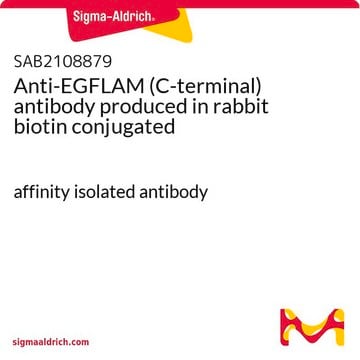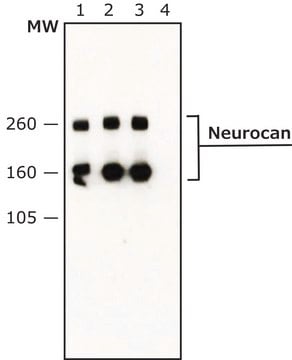おすすめの製品
由来生物
mouse
品質水準
抗体製品の状態
purified immunoglobulin
抗体製品タイプ
primary antibodies
クローン
monoclonal
化学種の反応性
chicken
メーカー/製品名
Chemicon®
テクニック
ELISA: suitable
immunoprecipitation (IP): suitable
western blot: suitable
アイソタイプ
IgG1
NCBIアクセッション番号
UniProtアクセッション番号
輸送温度
dry ice
ターゲットの翻訳後修飾
unmodified
遺伝子情報
human ... NCAN(1463)
詳細
Neurocan is the major soluble chondroitin sulfate proteoglycan in the brain. It is thought to play a functional role in axonal growth and guidance and in the establishment of specific neural pathways during embryonic brain development. Neurocan expression in the brain is developmentally regulated. Early on the major form of neurocan consists of a 245 kD core protein with approximately two chondroitin sulfate glycosoaminoglycan chains of 22 kD each. Later neurocan comprises a 180 kD core protein. Both forms of neurocan contain only chondroitin 4-sulfate glycosoaminoglycan chains. By virtue of their high expression at sites of neurnal damage and trauma, chondroitin sulfate proteoglycans, including neurocan, are thought to inhibit successful nerve regeneration.
特異性
Neurocan, chicken. Recognizes the middle region of neurocan.
アプリケーション
Anti-Neurocan Antibody is an antibody against Neurocan for use in ELISA, IP & WB.
Western blot: <0.5 μg/mL
Western blot using anti-chick Neurocan (MAB5234). Samples are 1) Untreated embryonic chick brain extract, 2) chondroitinase-treated embryonic chick brain extract, 3) GST fusion proteins from the middle region of chick neurocan.
Samples must be digested with chondroitinase prior to running on SDS gels because undigested phosphacan is too large for most gels. Treatment is at a concentration of chondroitinase of 10U/mL in Tris-HCL pH 8.0. Make tissue or cell extract in 20-50mM Tris pH 7.6-8.0 with 0.15M NaCl in the presence of protease inhibitors. Add 1 microliter of enzyme to 30 microliters of extract and incubate 30 minutes at 37C. Then add SDS sample buffer, heat or boil sample as normal for SDS reducing samples.
Immunoprecipitation: 1 μg/mL
ELISA: 1 μg/mL, excellent for core protein, good for monomer
Immunocytochemistry: not tested
Immunohistochemistry: does not work on fixed samples, unfixed has not been tested.
Optimal working dilutions must be determined by the end user.
Western blot using anti-chick Neurocan (MAB5234). Samples are 1) Untreated embryonic chick brain extract, 2) chondroitinase-treated embryonic chick brain extract, 3) GST fusion proteins from the middle region of chick neurocan.
Samples must be digested with chondroitinase prior to running on SDS gels because undigested phosphacan is too large for most gels. Treatment is at a concentration of chondroitinase of 10U/mL in Tris-HCL pH 8.0. Make tissue or cell extract in 20-50mM Tris pH 7.6-8.0 with 0.15M NaCl in the presence of protease inhibitors. Add 1 microliter of enzyme to 30 microliters of extract and incubate 30 minutes at 37C. Then add SDS sample buffer, heat or boil sample as normal for SDS reducing samples.
Immunoprecipitation: 1 μg/mL
ELISA: 1 μg/mL, excellent for core protein, good for monomer
Immunocytochemistry: not tested
Immunohistochemistry: does not work on fixed samples, unfixed has not been tested.
Optimal working dilutions must be determined by the end user.
物理的形状
Format: Purified
その他情報
Concentration: Please refer to the Certificate of Analysis for the lot-specific concentration.
法的情報
CHEMICON is a registered trademark of Merck KGaA, Darmstadt, Germany
Not finding the right product?
Try our 製品選択ツール.
保管分類コード
12 - Non Combustible Liquids
WGK
WGK 2
引火点(°F)
Not applicable
引火点(℃)
Not applicable
適用法令
試験研究用途を考慮した関連法令を主に挙げております。化学物質以外については、一部の情報のみ提供しています。 製品を安全かつ合法的に使用することは、使用者の義務です。最新情報により修正される場合があります。WEBの反映には時間を要することがあるため、適宜SDSをご参照ください。
Jan Code
MAB5234:
試験成績書(COA)
製品のロット番号・バッチ番号を入力して、試験成績書(COA) を検索できます。ロット番号・バッチ番号は、製品ラベルに「Lot」または「Batch」に続いて記載されています。
Keisuke Ikegami et al.
Scientific reports, 9(1), 13634-13634 (2019-09-22)
ST8 alpha-N-acetyl-neuraminide alpha-2,8-sialyltransferase 2 (ST8SIA2) synthesizes polysialic acid (PSA), which is essential for brain development. Although previous studies reported that St8sia2-deficient mice that have a mixed 129 and C57BL/6 (B6) genetic background showed mild and variable phenotypes, the reasons for
Rowena C Cua et al.
Glia, 61(6), 972-984 (2013-04-05)
Acute trauma to the central nervous system (CNS) can result in permanent damage and loss of function related to the poor regeneration of injured axons. Injured axons encounter several barriers to regeneration, such as the glial scar at the injury
Polysialylated NCAM and ephrinA/EphA regulate synaptic development of GABAergic interneurons in prefrontal cortex.
Brennaman, LH; Zhang, X; Guan, H; Triplett, JW; Brown, A; Demyanenko, GP; Manis et al.
Cerebral Cortex (1991)
Shane A Liddelow et al.
Nature, 541(7638), 481-487 (2017-01-19)
Reactive astrocytes are strongly induced by central nervous system (CNS) injury and disease, but their role is poorly understood. Here we show that a subtype of reactive astrocytes, which we termed A1, is induced by classically activated neuroinflammatory microglia. We
ライフサイエンス、有機合成、材料科学、クロマトグラフィー、分析など、あらゆる分野の研究に経験のあるメンバーがおります。.
製品に関するお問い合わせはこちら(テクニカルサービス)








